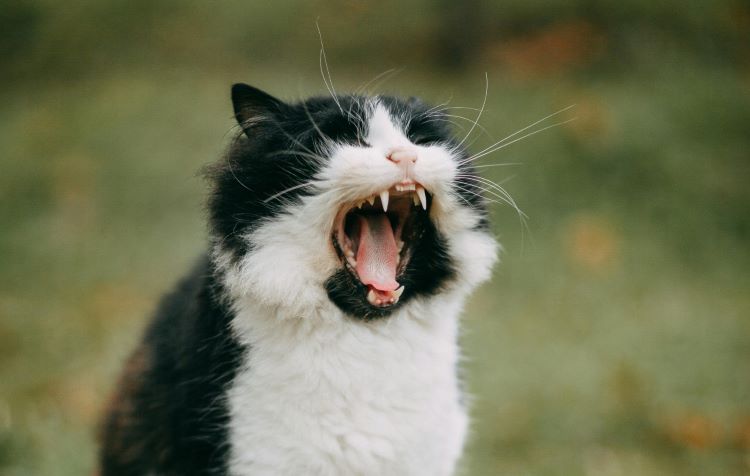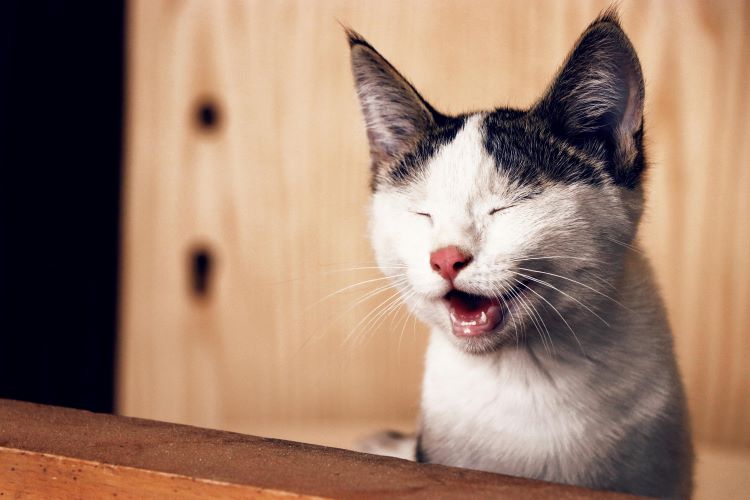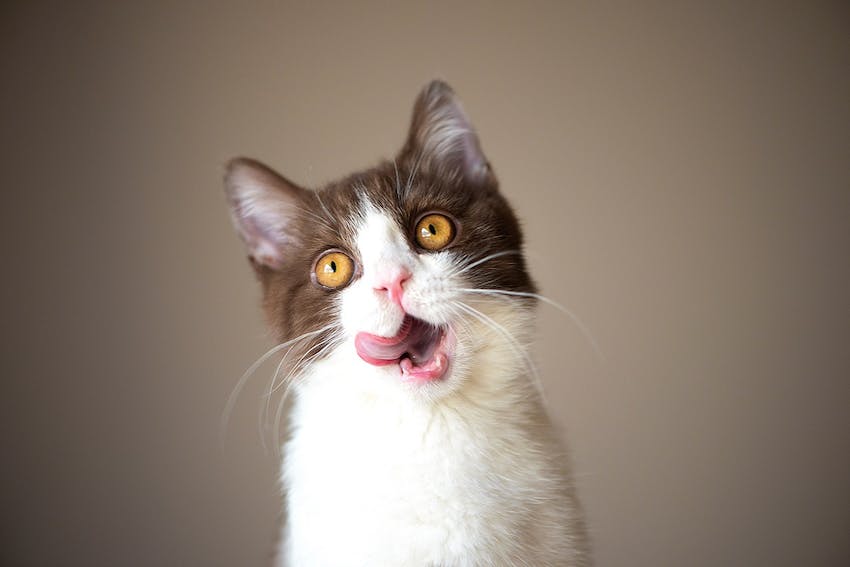Ready to help treat your pet to a healthy life?
Why Do Cats Yowl? 6 Possible Reasons
By : Kelli Rascoe & Trupanion Staff | Updated Sep 26, 2024

It's no secret that cats communicate in various ways, utilizing both vocalizations and body language to express their feelings. While some may meow or purr to express themselves, others rely on subtle physical cues. And then there's the yowl — often unsettling, this cry can come out of nowhere and be confusing,
If you're a cat owner wondering why your cat yowls — or what a feline yowl even is — we've got your back! To shed light on this curious behavior, we consulted with our in-house veterinary staff. Read on for some insights into the potential meanings behind this common feline vocalization.
What is yowling?
The first time you hear your cat yowl can be startling in a "what the heck was that?" kind of way. Yowling is different from regular meowing in that it's louder and more intense. It's a long, often high-pitched, cry is common in cats and other animals, and it could mean a variety of different things. Yowling can nevertheless vary in tone and pattern from cat to cat — some pet owners have described yowling as melodic, almost song-like, while others find it anything but. While typically made by wild animals when they are hurt or fighting, your pet could be trying to communicate something else.
Fascinatingly, some cats never yowl. Some cat breeds are also just more or less vocal than others. But for those that yowl regularly, it may be either part of their routine expression or the result of some sort of stress. That's why it's so important to learn why your cat is making this sound; especially if it's outside of their normal realm of behavior.

6 reasons cats yowl
According to Trupanion veterinarian Dr. Sarah Nold, cats like to communicate on their terms. And though they are creatures of habit, cats may vary the reasons behind why they meow or yowl. While one-off occurrences typically aren't something to be concerned about, a cat who is consistently yowling may be trying to communicate that they're in distress.
If your cat appears to be in pain, has recently been in an accident, or has recently eaten something they shouldn't have (like certain houseplants), seek veterinary attention immediately. But if you're like many pet owners scratching your head, wondering why your otherwise normal-seeming cat is walking around yowling, there are many reasons that could explain it. It's important to get to the bottom of things so you can find a solution.
Nold says there are several common reasons behind your cat's yowling behavior:
1. Stress
Your cat may react to any stressor, anything from new food to environment. If you find yourself asking, “Why does my cat yowl?” consider any recent lifestyle changes. If there has been a change in their home or daily schedule, they may be trying to communicate that something is bothering them.
2. Separation anxiety
Pets are a part of the family. While you resume work, school, and daily activities that may affect your furry friends, the disruption to your cat's usual daily interaction can cause separation anxiety. They could express these feelings of stress by yowling, especially if someone is home but not paying attention to them. You can help prevent yowling by making more slow, gradual changes to their routine. It's also important to make sure they have plenty of toys and interactive spaces (for safe climbing and scratching) to keep them occupied on their own.
3. Dementia
Nobody likes to think about the possibility of their pet beginning to decline in cognitive function, but conditions like dementia can occur as your pet’s ages. Although feline dementia can be rare, it can still affect a cat in a number of ways. This may mean they vocalize more to express how they’re feeling, and your cat might yowl. Talk with your veterinarian if you notice any abnormal changes in your cat, especially if those changes includes signs of confusion.
4. Hyperthyroidism
Hyperthyroidism in cats is a common endocrine disorder caused by the overproduction of thyroid hormones, usually due to an enlarged thyroid gland. This condition leads to symptoms such as weight loss, increased appetite, hyperactivity, and excessive vocalization, like yowling. It typically affects older cats and requires veterinary diagnosis and treatment.
5. High blood pressure
The pet medical condition of hypertension may be a reason why your cat yowls. After all, yowling is a way for your pet to communicate with you, including if they're just uncomfortable and don't know what's wrong with themselves. Hypertension in cats is a potentially serious condition that involves elevated blood pressure and could be the result of other underlying illnesses. So, it's important to seek medical attention to get your pet checked out as soon as possible, especially if you don't see any external stressors that could be causing them to yowl.
6. Attention
Last but certainly not least, one of the most common reasons cats yowl is quite simple: they want attention. Think about potential reasons why your cat may be asking you to spend more time with them. Has your schedule changed, are you busy working, or not home? Have you recently welcomed another pet into the family? Your cat may simply be trying to get your attention by yelling at you — think of it as a "Hey there! Look at me!" plea. Obviously the answer here is to give your pet some extra cuddles and playtime to help ease their insecurity.
Of course, this is typically just a short term solution, especially if your schedule has recently changed. If yowling for attention has become a consistent problem, you may want to talk with your veterinarian (more on that below) or even a pet behavior specialist. It also may be worth exploring other ways your pet can get some mental enrichment and positive interaction when you're not around or have other obligations. Incorporate interactive toys to help ease your cat’s woes, or consider having someone drop by to play with your cat when you're not around. If you have other pets, make sure you're splitting time equally among them all and doling out attention fairly.

When to seek veterinary attention
If your cat is showing any signs of pain, discomfort, or a change in their normal behavior, you should seek the medical care of your veterinarian. When your cat yowls, this may indicate that it’s time to see the vet. They can help determine the source of your pet’s pain and recommend a treatment plan for your best friend.
Remember that all cats are different and may respond to change in different ways. You may find that your cat is stressed in their environment or may have a pet health condition, and so your cat yowls frequently. Regardless, it's important to work with your pet's veterinarian and explore different solutions to find a way to achieve a peaceful household once more.
Find out answers to more cat behavior questions. Check out Are Cats Nocturnal? Cat Owner Questions Answered.
